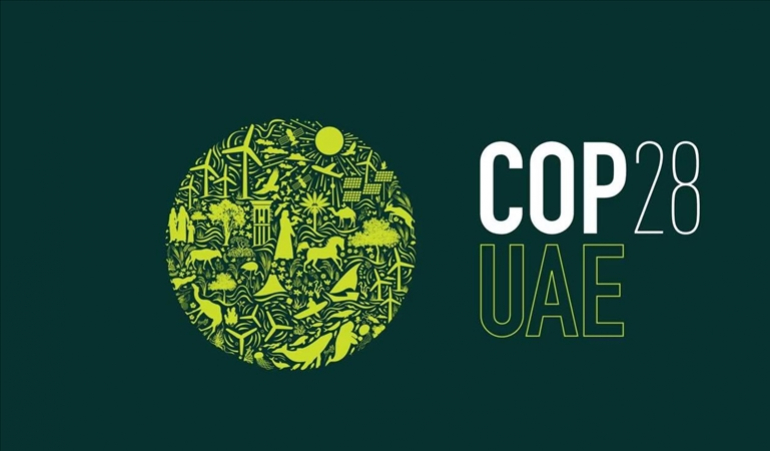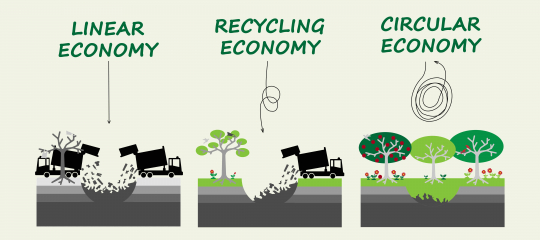
In Dubai, while COP 28 on climate change is in full swing, Wallonia is back in the Belgian pavilion on the Expo 2020 site with its proposals for tackling the environmental crisis. 5 industrial leaders in circularity are presenting their solutions for a more circular world and the metrics they are developing to assess the real impact of their actions. And it's working - Belgium already has the second-largest circular economy in Europe! 3 other Walloon companies working in the energy sector, and in particular in hydrogen production, are looking at technological ways of achieving carbon neutrality.
Two seminars to address two crucial issues at a time of global climate emergency.
"How can circularity help mitigate the climate emergency?"

The circular economy, a concept promoted by the Ellen MacArthur Foundation, aims to reduce, as far as possible, the input of something "new" into the economy, be it energy and/or raw materials. You can imagine the savings made in areas as varied as water, minerals, metals, textiles, plastics, etc. Wallonia has been committed to this approach for several years, and in 2021 will even adopt a circular economy deployment strategy called "Circular Wallonia".
This is an economy in which products and materials retain their value for as long as possible. Waste and the use of resources are reduced to a minimum. And when a product reaches the end of its life, the resources that make it up are kept in the economic cycle so that they can be used again and again to recreate value. A virtuous circle to which these 5 Walloon leaders subscribe:
- The Centre Terre et Pierre (CTP) offers a wide range of skills and analyses to companies exploring and developing natural mineral deposits, as well as to companies processing and recycling post-consumer industrial and urban waste ('Urban Mining').
- Ets Dufour offers its services for all types of site: lifting, transport, handling, concrete, civil engineering, energy in wind power projects, infrastructure, construction, civil engineering, energy, etc. It is also an effective partner in waste collection, management, treatment and recycling. With more than 1,000 employees working in 12 local branches in Belgium and France, the group has the largest fleet of high-capacity lifting cranes, a fleet of heavy goods vehicles and civil engineering equipment.
- Ecosteryl manufactures machines for shredding and decontaminating medical and hospital waste. With more than 200 installations and sites in over 60 countries, Ecosteryl is a leader in the management of infectious medical waste. The aim? To eradicate the environmental and health problems associated with this type of waste worldwide.
- D-Cabonize provides organisations with a SaaS tool for measuring their carbon footprint, planning a personalised carbon strategy, reducing and offsetting their CO2 emissions, all autonomously thanks to human-centred, business-oriented technology to meet new sustainable needs.
- JGI Hydrometal specialises in recycling complex materials containing non-ferrous metals. Using tailor-made hydrometallurgical processes, this key player in the circular economy is able to recycle a wide range of secondary materials, co-products, residues and waste, offering a valuable alternative to technical landfill
"From hydrogen to carbon neutrality: technological solutions at global and regional level".

The production of hydrogen is not new (it dates back to the 17th century), but at the time it was not produced from renewable energy sources. We talk of green hydrogen when the electricity needed to electrolyse the water comes from a renewable energy source (solar or wind power, for example). Green hydrogen is one of the ways in which sectors such as transport and industry can be decarbonised, thereby responding to the ecological emergency and the need to reduce CO2 emissions.
- John Cockerill :its offer to businesses, governments and local authorities consists of services and associated equipment for the energy, defence, industry, environment, transport and infrastructure sectors. A pioneer in hydrogen production, the group has already designed electrolysers and storage solutions for nearly 1,000 customers in a wide range of industrial sectors.Today, John Cockerill offers the most powerful electrolysers on the market, capable of producing up to 1300Nm³ per hour (the equivalent of 6.5 megawatts (MW).
- Le Centre de Recherches Métallurgiques (CRM group) : production, transformation, coating and use of metallic materials. The group works on the development of so-called intelligent metals and covers the entire metal production and application chain, from basic materials to advanced applications, from the laboratory to pilot units and even semi-industrial production lines.
- Beblue Cryotech : this spin-off from the University of Liège is Europe's strategic supplier of cryogenic testing (testing materials in a cryogenic environment provides characteristic values for materials at very low temperatures.This technique makes it possible to study the behaviour of materials at real operating temperatures). Its current target markets are space and green mobility (hydrogen sector).